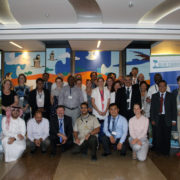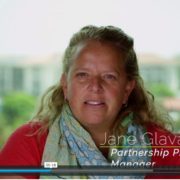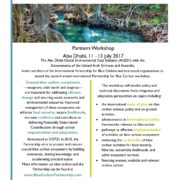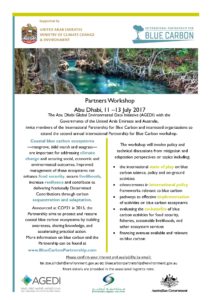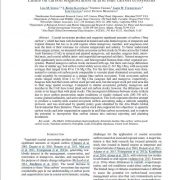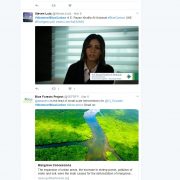خلال اجتماعهم السنوي الثاني وافق أعضاء الشراكة الدولية من أجل الكربون الأزرق على التوجيهات والأنشطة المستقبلية
- قامت مبادرة أبوظبي العالمية للبيانات البيئية، بالتعاون مع وزارة التغير المناخي والبيئة، والحكومة الاسترالية ممثلة في وزارة البيئة والطاقة بتنظيم الاجتماع السنوي الثاني لأعضاء الشراكة الدولية من أجل الكربون الأزرق.
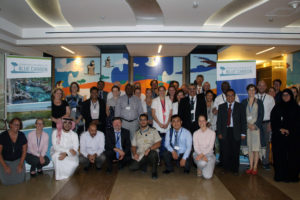
أبوظبي، الإمارات العربية المتحدة: 17 يوليو 2017 – استضافت مبادرة أبوظبي العالمية للبيانات البيئية الاجتماع السنوي الثاني لأعضاء الشراكة الدولية من أجل الكربون الأزرق، في الفترة من 11- 13 يوليو الجاري. وقد أعلنت الحكومة الأسترالية عن تأسيس هذه الشراكة خلال مؤتمر الأطراف 21 ، الذي انعقد في باريس سنة 2015. تتكون هذه الشراكة من ائتلاف عدة حكومات، ومنظمات غير ربحية، وجهات غير حكومية، لتزويد صناع السياسات بمعلومات موثوقة حول أنظمة الكربون الأزرق (أشجار القرم، والسبخات والأعشاب البحرية) للحد من ظاهرة التغير المناخي، وتحقيق مخرجات اجتماعية واقتصادية وبيئية متميزة.
تساهم الإدارة الفاعلة للنظم البيئية للكربون الأزرق في تعزيز الأمن الغذائي، وسبل المعيشة والرزق، وزيادة المرونة في تحقيق الإسهامات المعتزمة المحددة وطنياً من خلال احتجاز الكربون وتخزينه والتكيف مع آثاره. كما تهدف هذه الشراكة إلى حماية واستعادة النظم البيئية الساحلية للكربون الأزرق، من خلال تعزيز التوعية، ومشاركة المعلومات، وسرعة اتخاذ الخطوات العملية ذات الصلة.
وصرح أحمد باهارون، مدير مبادرة أبوظبي العالمية للبيانات البيئية بالإنابة:” بأن دولة الإمارات العربية المتحدة تلعب دوراً قيادياً في بحوث ودراسات النظم البيئية الساحلية للكربون الأزرق، حيث تمتد أشجار القرم في دولة الإمارات على مساحة تبلغ 14,000 هكتار، بالإضافة إلى السبخات الملحية الممتدة على مساحات واسعة، ومروج الأعشاب البحرية التي يتغذى عليها ثاني أكبر تجمع لأبقار البحر في العالم.”
وأضاف باهارون:” تلتزم مبادرة أبوظبي العالمية للبيانات البيئية بدعم من هيئة البيئة – أبوظبي، وبالشراكة مع وزارة التغير المناخي والبيئية بتحقيق الأهداف الوطنية والإقليمية والعالمية لضمان وضع علم الكربون الأزرق في مقدمة الجهود الدولية للحد من ظاهرة التغير المناخي الطبيعية، ويأتي دورنا في الشراكة الدولية من أجل الكربون الأزرق في إطار هذا الالتزام.”
تضمّن الاجتماع السنوي الثاني للشراكة الدولية من أجل الكربون الأزرق مناقشات سياسية وتقنية من منظور الحد من التغير المناخي والتكيف مع آثاره، حيث ساهمت الجهود المبذولة على المستوى الدولي في تعزيز العلوم والسياسات والأنشطة الفعلية المتعلقة بالكربون الأزرق، كما ناقش الاجتماع التقدم الذي شهدته أطر عمل السياسات الدولية المتعلقة بالكربون الأزرق، وتناول سبل التمويل المبتكر لتنفيذ الأنشطة ذات الصلة بفاعلية أكثر. حضر الاجتماع أعضاء من المنظمات الدولية، وممثلين من جهات حكومية أفريقية، وأوروبية، وأمريكية، وأسيوية بالإضافة إلى مشاركين من القطاع الخاص والمنظمات غير الحكومية.
وأشار المتحدث باسم وزارة البيئة والطاقة الاسترالية: “أن أستراليا تتميز بأكبر مساحة في العالم للأراضي الساحلية الرطبة، وقد وضعنا عدداً من السياسات للمحافظة على هذه النظم البيئية، والكثير من الأنواع المهاجرة والمهددة بالانقراض التي تتخذ من هذه الأراضي موطناً لها. كما قدمت أستراليا هذا العام تقريراً حول أشجار القرم والسبخات المدية في الجرد الذي قمنا به حول انبعاثات غازات الدفيئة، لذلك اعتقد أنه من الضروري أن نتعاون سوياً لتبادل الخبرات في المحافظة على هذه النظم البيئية الهامة، وتعتبر هذه الشراكة أحد أبرز أمثلة التعاون المشترك في هذا الشأن.”
وفي سياق متصل، قالت المهندسة منى عمران ماجد الشامسي، مدير إدارة التنوع البيولوجي بالإنابة في وزارة التغير المناخي والبيئة: “نعمل في دولة الإمارات العربية المتحدة بشكل مكثف للمحافظة على الموارد البحرية، ومصايد الأسماك المستدامة، واستزراع الأحياء المائية، بالإضافة إلى الجهود البحثية والتنموية، ومن ضمن المجالات التي نركز عليها، هي حماية النظم البيئية للكربون الأزرق.”
وأضافت: “نتعاون عن كثب مع هيئة البيئة – أبوظبي، ومبادرة أبوظبي العالمية للبيانات البيئية والجهات المعنية لتقييم مخزون الكربون الذي تحمله الأنظمة البيئية، كما ساعدتنا هذه الدراسات في تحديد مخزون الكربون القيم للغاية، وترسيخ أهمية إجراءات المحافظة على النظم البيئية للكربون الأزرق وحمايتها، حيث أن دمار هذه النظم يعني إطلاق الكربون في الغلاف الجوي والمساهمة في ظاهرة الاحتباس الحراري، فعلى سبيل المثال، يستغرق الأمر عقوداً من الزمن حتى تتمكن أشجار القرم الحديثة من تخزين كمية الكربون التي تكافئ ما تختزنه غابات القرم المزروعة منذ القدم، لذلك نحرص على إبراز أهمية المحافظة على النظم البيئية للكربون الأزرق في إطار الإسهامات المحددة وطنياً، ونفخر أن نكون جزءاً من هذه المبادرة.”
للمزيد من المعلومات حول الكربون الأزرق، أو الشراكة أو مخرجات الاجتماع، والاجتماعات المستقبلية، يمكنكم زيارة الرابط التالي www.bluecarbonpartnership.org.
–انتهى–
نبذة حول وزارة البيئة والطاقة في الحكومة الاسترالية
تقوم وزارة البيئة والطاقة الاسترالية بتصميم وتنفيذ سياسات وبرامج الحكومة الاسترالية لحماية البيئة والمياه والتراث الطبيعي والمحافظة عليهم، كما تعمل على تعزيز الجهود في مجال المناخ. يرتكز إطار العمل البيئي على أربعة محاور رئيسية: هواء نقي، أراضي ومياه نظيفة، وتراث طبيعي. تتعاون وزارة البيئة والطاقة مع وزارة الخارجية الأسترالية لتعزيز الدور الريادي للحكومة الاسترالية في الشراكة الدولية من أجل الكربون الأزرق، باعتبارها عضو في المجموعة التنسيقية.
نبذة عن وزارة التغير المناخي والبيئة
أنشئت وزارة التغير والمناخي والبيئة في شهر فبراير من العام 2006 تحت مسمى “وزارة البيئة والمياه”. وقد تم اعتماد مسماها الجديد في فبراير 2016 خلال التشكيل الوزاري الجديد بعد إضافة ملف التغير المناخي لمسؤولياتها السابقة، وذلك لتدشين مرحلة جديدة بهدف تعزيز الجهود الوطنية للتعامل مع كافة القضايا البيئية الملحة وفي مقدمتها التغير المناخي. حيث ستعمل الوزارة خلال المرحلة القادمة على الإرتقاء بالمكانة المرموقة لدولة الإمارات في كافة المحافل الدولية وتعزيز المكتسبات التي تحققت طوال السنوات الماضية وإدارة الموارد وحمايتها وتعزيز الأمن الغذائي بما يحقق طموحات قيادتنا الرشيدة في التحول الى نموذج رائد للتنمية المستدامة.
لمزيد من المعلومات، يرجى إرسال أي استفسارات على عنوان البريد الالكتروني التالي: Media@moccae.gov.ae
نبذة عن مبادرة أبوظبي العالمية للبيانات البيئية
توفر “مبادرة أبوظبي العالمية للبيانات البيئية” التي أطلقتها هيئة البيئة – أبوظبي في عام 2002 إمكانية الاستخدام الأمثل للبيانات البيئية عالية الجودة من خلال باقة متنوعة من المنتجات المعلوماتية. وتعمل الهيئة على دعم المبادرة على المستوى المحلي في حين يقوم برنامج الأمم المتحدة للبيئة بدعمها على المستويين الإقليمي والعالمي. وتشمل أهداف مبادرة أبوظبي العالمية للبيانات البيئية تعزيز القدرة على جمع وتقييم البيانات البيئية، زيادة إسهام البيانات في صناعة القرارات البيئية على المستويات المحلية والوطنية والإقليمية والعالمية، التأكد من وضع خطط التنمية المستدامة بالاعتماد على بيانات ومعلومات حديثة وسهلة الاستخدام وعالية الجودة، تعزيز إمكانيات وصول جميع الشركاء إلى البيانات والمعلومات البيئية، وتحسين الآليات الوطنية والدولية المتعلقة بمعالجة المعلومات وتبادلها، وتطوير الإمكانيات الوطنية في مجال معالجة المعلومات والاتصالات. لمزيد من المعلومات الرجاء زيارة.
نبذة حول هيئة البيئة – أبوظبي
تلتزم هيئة البيئة – أبوظبي، التي تأسست في عام 1996، بحماية وتعزيز جودة الهواء، والمياه الجوفية بالإضافة إلى حماية التنوع البيولوجي في النظم البيئية الصحراوية والبحرية في إمارة أبوظبي. ومن خلال الشراكة مع جهات حكومية أخرى، والقطاع الخاص والمنظمات غير الحكومية، والمنظمات البيئية العالمية، تعمل الهيئة على تبني أفضل الممارسات العالمية، وتشجيع الابتكار والعمل الجاد لاتخاذ تدابير، وسياسات فعالة. كما تسعى الهيئة لتعزيز الوعي البيئي، والتنمية المستدامة، وضمان استمرار إدراج القضايا البيئية ضمن أهم الأولويات في الأجندة الوطنية. www.ead.ae

